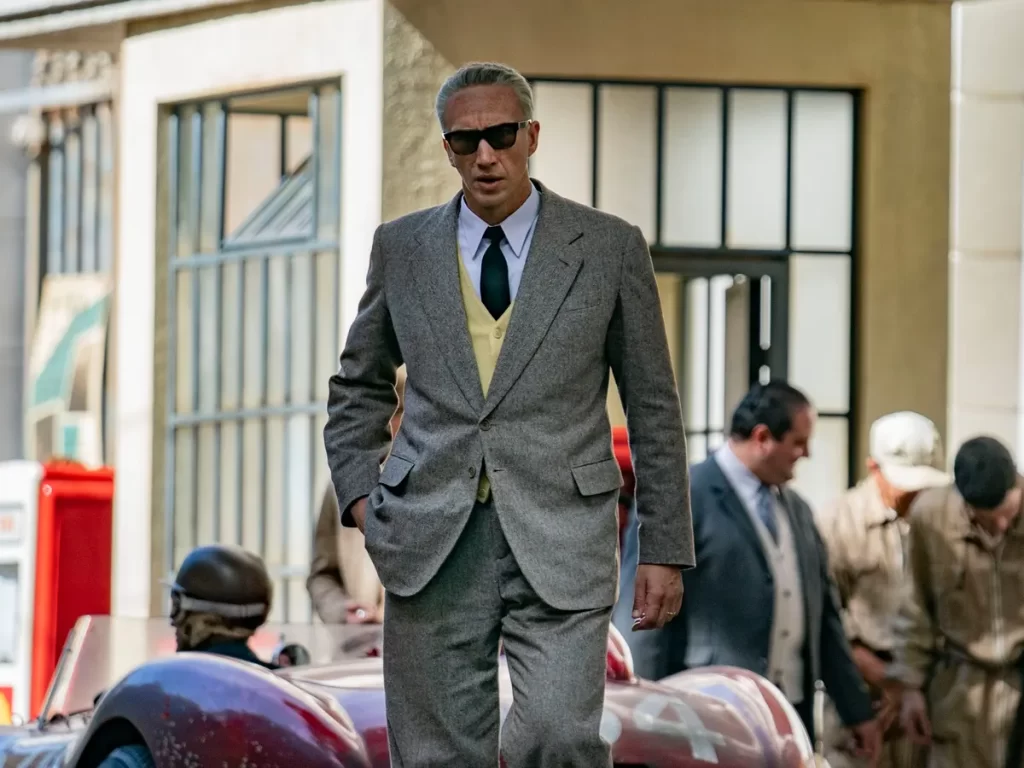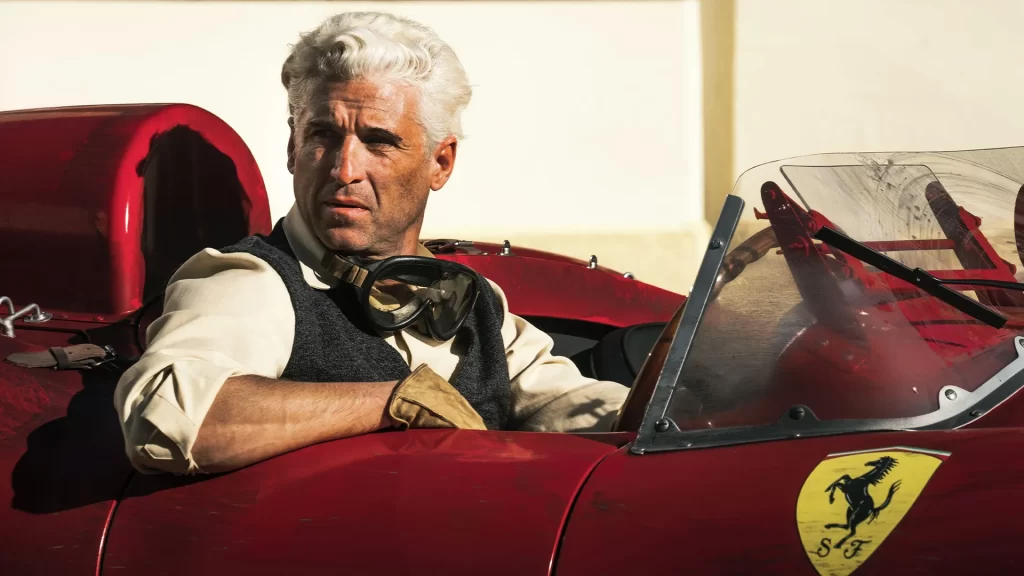
Is Michael Mann secretly a conventional filmmaker? The auteur is renowned for his bracing sense of style—the sleek digital photography, the dreamy music, the propulsive momentum—but he often wields his technique in the service of familiar, fact-based narratives. There’s nothing wrong with this; Ali is a solid sports movie, while the underrated Public Enemies bristles with an electricity that belies its stature as a docudrama. Now comes Ferrari, a serviceable picture that can’t help feeling disappointingly ordinary, lacking Ali’s personal depth and Public Enemies’ invigorating… well, drive.
To the movie’s credit, it unfolds over a narrow period of time, disdaining the swollen hagiography that afflicts so many biopics. The brunt of its action takes place in 1957, when Enzo Ferrari (Adam Driver) is facing a reckoning in both his personal and professional lives. On the home front, his already-strained marriage with his wife, Laura (Penélope Cruz)—still grieving the death of their son, who suffered from muscular dystrophy—is at risk of collapse, given that he’s struggling to continually conceal the existence of the boy he fathered during World War II with his mistress, Lina Lardi (Shailene Woodley). And in his business, he’s receiving reports of unprofitability and a corresponding erosion of the Ferrari brand—a diminution he hopes to reverse by winning the Mille Miglia, a race that (in case your grasp of Italian is even worse than mine) runs 1,000 stressful miles and carves through the country’s public roadways.

Structurally, then, Ferrari operates similarly to Napoleon, toggling between its protagonist’s marital squabbles and the historical exploits of a celebrity whose surname alone can serve as the title of a great-man picture. Despite capable performances from the actors—Driver simmers purposefully, Cruz gets to deliver a couple of fiery monologues, and Woodley tamps down her charisma and conveys the powerlessness of a person who recognizes her status as “the other woman” (if nothing else, she’s less wasted here than she was in Dumb Money)—the melodrama fails to achieve clarity or intensity. There are pained glances and stern ultimatums and quite a bit of shouting, but the frantic emotions on display never crystallize into poignancy.
This isn’t exactly a surprise coming from Mann, who tends to be most engaged when tackling the subject of men at work. Yet Ferrari’s portrait of an obsessive leader and his cohort of talented underlings feels weirdly generic, lacking the lived-in rhythm that the director brings to his best projects. Most of the drivers at Enzo’s command are relatively anonymous (the one who isn’t is played by Patrick Dempsey, creating its own set of problems), limiting the sense of camaraderie that James Mangold brought to Ford v Ferrari. Scenes where Enzo strategizes with his racers should hum with granular detail, but instead the screenplay (by Troy Kennedy Martin, adapting the book by Brock Yates) resorts to banal platitudes about competitiveness and hunger.

Thankfully, Ferrari is still a Michael Mann movie, which means it gussies up its predictable storyline with craft and force. The colors really pop (the cinematographer is Erik Messerschmidt, the David Fincher regular who just shot The Killer), while the framing smoothly alternates between tense close-ups and elegant wide compositions. Midway through, a scene set in an opera house transforms into a bravura flashback montage that inventively supplies reams of exposition with scarcely a word of dialogue. And the racing scenes themselves strike the proper balance between vigor and coherence; it helps that the men are driving death-trap convertibles, allowing Mann to show their faces without cutting to the vehicle’s interior. (One drawback: In what’s presumably a concession to historical accuracy, the cars of team Ferrari and their chief rival, Maserati, are both bright red, making it difficult to distinguish between the putative heroes and villains.)
Late in Ferrari—and I suppose I should preface this with a spoiler warning—one of Enzo’s drivers suffers a horrific crash, his car vaulting into the air before plummeting back to earth and demolishing the helpless onlookers in its path. It’s a ghastly moment, rendered with consummate authenticity by Mann, and its nightmarish quality lends the film an unholy jolt of energy, even as it throws the preceding events into unflattering relief. I’m not suggesting that Mann should have manufactured further automotive carnage—just soberly recognizing that this passable, far-from-great movie spends too much time idling in middle gear.
Grade: B-
Jeremy Beck is the editor-in-chief of MovieManifesto. He watches more movies and television than he probably should.
